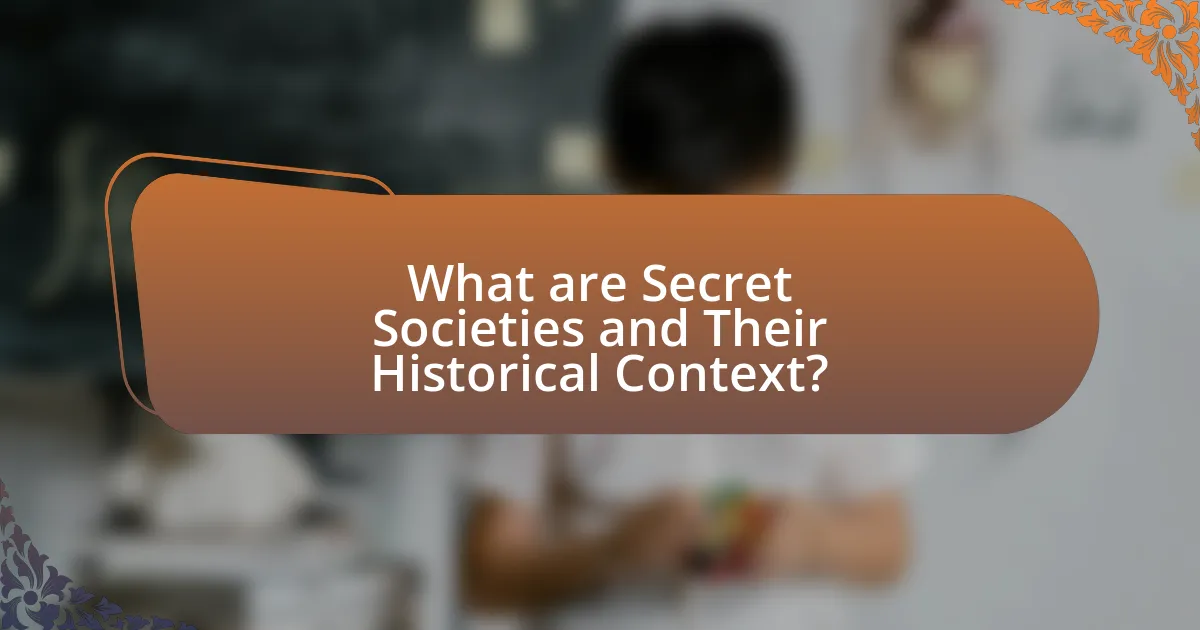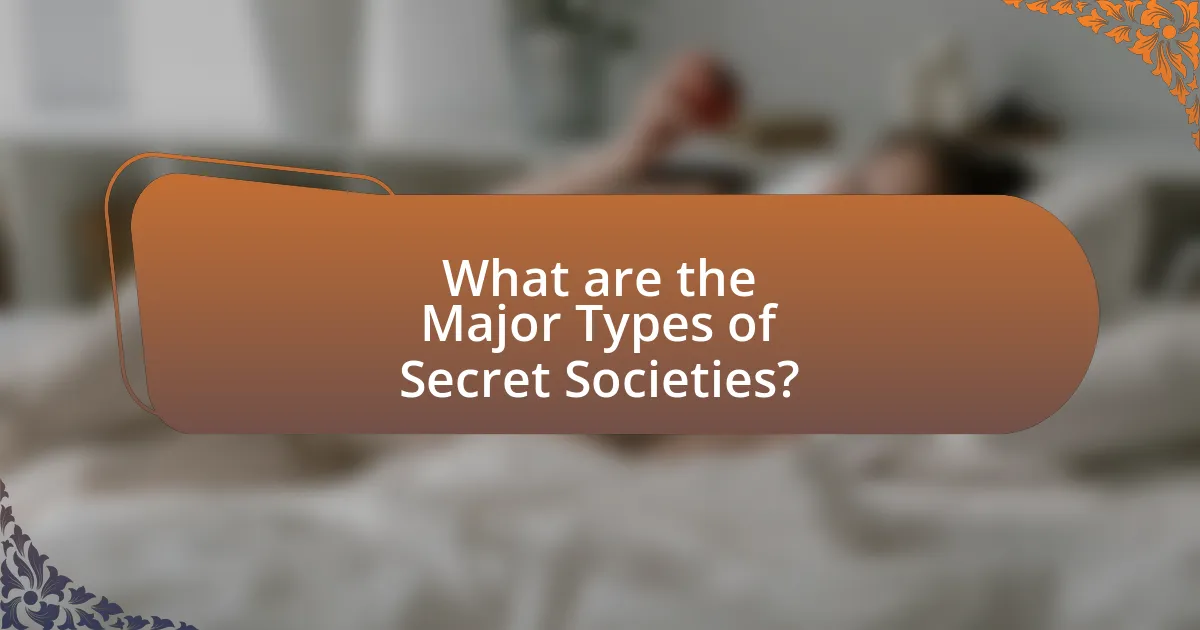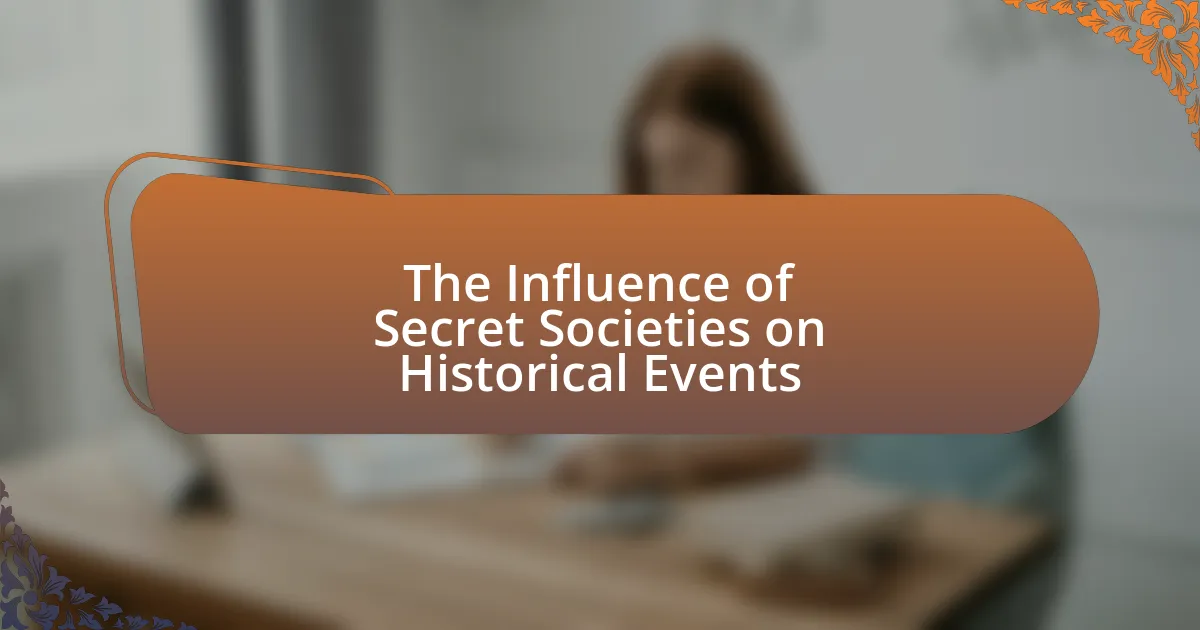Secret societies are clandestine organizations characterized by exclusive membership, rituals, and shared ideologies, often emerging in response to social, political, or religious oppression. This article examines the historical context of secret societies, their influence on political landscapes, and their roles in significant events such as the American and French Revolutions. It explores how these societies operate within political systems, contribute to social movements, and the motivations behind individual membership. Additionally, the article analyzes the types of secret societies, their characteristics, and the methodologies used to study their impact on history, providing insights into their lasting significance in shaping societal structures and governance.

What are Secret Societies and Their Historical Context?
Secret societies are clandestine organizations that often operate under a veil of secrecy, typically characterized by exclusive membership, rituals, and a shared purpose or ideology. Historically, these societies have emerged in various cultures and periods, often in response to social, political, or religious oppression. For instance, the Freemasons, founded in the late 16th to early 17th century, played a significant role in the Enlightenment and the American Revolution, promoting ideals of liberty and fraternity. Similarly, the Illuminati, established in 1776 in Bavaria, sought to promote Enlightenment values and counter religious and political oppression. These societies have influenced historical events by fostering networks of like-minded individuals who could mobilize for social change, often operating in secrecy to evade persecution or censorship.
How have secret societies influenced political landscapes throughout history?
Secret societies have significantly influenced political landscapes throughout history by shaping ideologies, facilitating revolutions, and manipulating power dynamics. For instance, the Freemasons played a crucial role in the American Revolution, with many founding fathers being members, which helped promote Enlightenment ideals and democratic governance. Similarly, the Illuminati, founded in 1776, aimed to promote rationalism and secularism, influencing political thought in Europe. The Carbonari in Italy were instrumental in the unification of Italy during the 19th century, demonstrating how secret societies can mobilize grassroots movements for political change. These examples illustrate that secret societies have often acted as catalysts for political transformation, leveraging their networks and shared beliefs to impact governance and societal structures.
What specific events were shaped by the actions of secret societies?
The actions of secret societies have significantly shaped various historical events, including the American Revolution, the French Revolution, and the rise of the Illuminati. The American Revolution was influenced by groups like the Freemasons, who fostered revolutionary ideas and provided a network for dissent against British rule. The French Revolution saw the involvement of the Jacobins, who were linked to secret societies that promoted radical change and the overthrow of the monarchy. Additionally, the Illuminati, founded in 1776, aimed to promote Enlightenment ideals and influenced political movements across Europe, leading to widespread societal changes. These examples illustrate how secret societies have played pivotal roles in shaping key historical events through their clandestine operations and ideological influence.
How do secret societies operate within political systems?
Secret societies operate within political systems by exerting influence through networking, information control, and strategic alliances. These organizations often consist of members who hold significant power in politics, business, or academia, allowing them to shape policies and decisions behind the scenes. For example, the Freemasons, which have historically included influential political figures, have been known to promote mutual support among members, thereby impacting legislative processes and governance. Additionally, secret societies can manipulate public perception and political discourse by controlling narratives and disseminating information selectively, as seen in various historical contexts where such groups have played pivotal roles in revolutions or political movements.
What role do secret societies play in social movements?
Secret societies often serve as catalysts for social movements by providing a structured network for like-minded individuals to organize, strategize, and mobilize. These groups can facilitate the dissemination of revolutionary ideas, as seen in historical contexts such as the Freemasons’ influence during the American and French Revolutions, where their principles of liberty and equality inspired broader societal change. Additionally, secret societies can offer a sense of belonging and purpose, which can empower members to take collective action, as evidenced by the role of the Carbonari in Italy’s unification efforts in the 19th century. Their clandestine nature allows for the exchange of sensitive information and planning away from public scrutiny, enhancing their effectiveness in challenging established norms and authorities.
How have secret societies contributed to major social changes?
Secret societies have significantly contributed to major social changes by facilitating the exchange of revolutionary ideas and fostering networks of influence. For instance, the Freemasons played a crucial role in the Enlightenment, promoting values such as liberty and equality, which influenced the American and French Revolutions. Their clandestine meetings allowed for the discussion of progressive ideas that challenged the status quo, ultimately leading to the establishment of democratic governments. Additionally, the Illuminati, founded in 1776, aimed to promote rationalism and secularism, impacting social reforms in Europe. These societies often operated in secrecy to evade oppressive regimes, allowing them to mobilize support for social change without immediate repercussions.
What are some notable examples of secret societies involved in social reform?
Notable examples of secret societies involved in social reform include the Freemasons, the Odd Fellows, and the Knights of Labor. The Freemasons, established in the late 16th to early 17th century, promoted Enlightenment ideals such as liberty, equality, and fraternity, influencing democratic movements. The Odd Fellows, founded in the 18th century, focused on mutual aid and community service, contributing to social welfare initiatives. The Knights of Labor, formed in the 1860s, advocated for workers’ rights and social justice, playing a significant role in labor reform during the industrial era. These societies collectively impacted social structures and reform movements throughout history.
Why do individuals join secret societies?
Individuals join secret societies primarily for a sense of belonging and to gain access to exclusive networks. These societies often provide members with social connections, shared values, and opportunities for personal and professional advancement. Historical evidence shows that many influential figures, such as politicians and business leaders, have participated in secret societies to enhance their social capital and influence decision-making processes. For instance, the Freemasons, one of the most well-known secret societies, have historically attracted members seeking camaraderie and mutual support, which has been documented in various historical accounts and studies.
What motivations drive membership in secret societies?
Membership in secret societies is primarily driven by the desire for exclusivity, social networking, and the pursuit of shared beliefs or goals. Individuals often seek the sense of belonging and camaraderie that these societies provide, which can lead to personal and professional advancement. Historical evidence shows that many influential figures, such as politicians and business leaders, have joined secret societies to gain access to powerful networks and resources, enhancing their social capital. For instance, the Freemasons, one of the most well-known secret societies, have historically attracted members seeking mutual support and influence in various societal sectors.
How does the allure of secrecy impact recruitment?
The allure of secrecy significantly enhances recruitment by creating an exclusive and enticing environment that attracts individuals seeking belonging and purpose. This exclusivity fosters a sense of intrigue and curiosity, compelling potential recruits to engage with the organization. Historical evidence shows that secret societies, such as the Freemasons, have utilized this allure to attract members by promising access to hidden knowledge and a network of influential connections, thereby increasing their appeal. The combination of mystery and the promise of belonging drives individuals to seek membership, as seen in various historical contexts where secrecy has been a pivotal factor in recruitment strategies.

What are the Major Types of Secret Societies?
The major types of secret societies include fraternal organizations, religious sects, political groups, and esoteric societies. Fraternal organizations, such as the Freemasons, focus on brotherhood and mutual aid, often engaging in charitable activities. Religious sects, like the Rosicrucians, blend spiritual beliefs with secrecy, aiming for enlightenment. Political groups, such as the Illuminati, historically sought to influence governance and societal structures. Esoteric societies, including the Hermetic Order of the Golden Dawn, emphasize mystical knowledge and personal transformation. Each type has played a significant role in shaping historical events, influencing social, political, and cultural landscapes throughout history.
What are the characteristics of fraternal organizations?
Fraternal organizations are characterized by their focus on brotherhood, mutual support, and shared values among members. These organizations often emphasize social, charitable, and community service activities, fostering a sense of belonging and camaraderie. Additionally, fraternal organizations typically have structured rituals, codes of conduct, and membership requirements that promote loyalty and commitment among members. Historical examples, such as the Freemasons and the Odd Fellows, illustrate how these organizations have played significant roles in social networking and community building, influencing various historical events through their collective actions and philanthropic efforts.
How do fraternal organizations differ from other secret societies?
Fraternal organizations differ from other secret societies primarily in their focus on brotherhood, community service, and social networking rather than solely on secrecy or exclusive rituals. Fraternal organizations, such as the Freemasons or the Odd Fellows, often emphasize charitable activities and personal development, while many secret societies prioritize maintaining secrecy and exclusivity, sometimes with political or ideological motives. For instance, the Freemasons have a long history of community involvement and philanthropy, which contrasts with the more clandestine nature of groups like the Illuminati, known for their secretive agendas. This distinction highlights the broader societal roles that fraternal organizations play compared to the often insular focus of other secret societies.
What historical examples illustrate the influence of fraternal organizations?
Fraternal organizations have significantly influenced historical events, with notable examples including the Freemasons’ role in the American Revolution and the Odd Fellows’ impact on social welfare in the 19th century. The Freemasons, a prominent fraternal organization, included key figures such as George Washington and Benjamin Franklin, who utilized Masonic networks to promote revolutionary ideas and foster unity among the colonies. Their influence helped shape the foundational principles of the United States, emphasizing liberty and fraternity. Similarly, the Odd Fellows, established in the early 1800s, contributed to the development of mutual aid societies that provided support for the poor and sick, thereby influencing social reform movements and the establishment of public welfare systems in the United States. These examples illustrate how fraternal organizations have played crucial roles in shaping political, social, and economic landscapes throughout history.
What distinguishes political secret societies from other types?
Political secret societies are distinguished from other types by their primary focus on influencing governance and political power. Unlike social or fraternal secret societies, which may prioritize personal development or social networking, political secret societies actively engage in clandestine activities aimed at shaping political outcomes, often through manipulation, lobbying, or covert operations. Historical examples include the Illuminati and the Freemasons, which have been linked to significant political events and decisions, demonstrating their intent to affect political landscapes. This focus on political influence sets them apart from other secretive organizations that do not engage directly in political maneuvering.
How have political secret societies impacted governance?
Political secret societies have significantly impacted governance by influencing political decisions, shaping policies, and facilitating the rise of certain leaders. For instance, the Freemasons, a prominent secret society, have historically been linked to the founding of democratic institutions in the United States, with many Founding Fathers being members. Their influence is evident in the promotion of Enlightenment ideals, which shaped the U.S. Constitution and governance structures. Additionally, the Skull and Bones society at Yale has been associated with the recruitment of influential political leaders, including several U.S. Presidents, thereby impacting governance through elite networking and shared agendas. These societies often operate behind the scenes, allowing them to exert influence without public scrutiny, which can lead to policies that reflect their interests rather than the broader public good.
What are some key historical political secret societies?
Key historical political secret societies include the Freemasons, the Illuminati, and the Skull and Bones. The Freemasons, founded in the late 16th to early 17th century, played a significant role in the American Revolution, influencing key figures like George Washington. The Illuminati, established in 1776 in Bavaria, aimed to promote Enlightenment ideals and counter religious influence in public life, impacting political thought in Europe. Skull and Bones, founded in 1832 at Yale University, has been linked to numerous U.S. political leaders, including Presidents William Howard Taft and George H.W. Bush, shaping elite networks in American politics. These societies have historically influenced political events through their clandestine operations and networks.
What is the significance of esoteric societies?
Esoteric societies are significant because they often serve as platforms for the exploration and dissemination of hidden knowledge, spiritual teachings, and philosophical ideas that challenge mainstream beliefs. Historically, these societies, such as the Rosicrucians and Freemasons, have influenced cultural, political, and scientific developments by fostering networks of intellectual exchange and promoting alternative worldviews. For example, the Enlightenment period saw many thinkers associated with esoteric societies advocating for reason and individualism, which contributed to revolutionary ideas in Europe and America. Their impact is evident in various historical events, such as the American and French Revolutions, where members of these societies played crucial roles in advocating for liberty and social reform.
How do esoteric societies influence cultural and philosophical thought?
Esoteric societies influence cultural and philosophical thought by promoting alternative perspectives and hidden knowledge that challenge mainstream beliefs. These societies, such as the Rosicrucians and Freemasons, often emphasize the importance of personal enlightenment and the exploration of metaphysical concepts, which can lead to significant shifts in societal values and intellectual discourse. For instance, the Enlightenment period was heavily influenced by esoteric ideas that encouraged rationalism and individualism, as seen in the works of philosophers like Voltaire and Rousseau, who were connected to such societies. Additionally, the integration of esoteric symbols and teachings into art and literature has historically inspired movements like Romanticism, further shaping cultural narratives and philosophical inquiries.
What are notable esoteric societies and their contributions?
Notable esoteric societies include the Freemasons, the Rosicrucians, and the Hermetic Order of the Golden Dawn, each contributing significantly to cultural and philosophical developments. The Freemasons, established in the late 16th century, promoted Enlightenment ideals, influencing democratic movements and the founding of modern governments, notably in the United States. The Rosicrucians, emerging in the early 17th century, contributed to the development of scientific thought and mystical philosophy, impacting figures like Isaac Newton. The Hermetic Order of the Golden Dawn, founded in the late 19th century, advanced the study of the occult and influenced modern magical practices, shaping contemporary esotericism. These societies have played pivotal roles in shaping philosophical, political, and cultural landscapes throughout history.

How Can We Analyze the Impact of Secret Societies on Historical Events?
To analyze the impact of secret societies on historical events, researchers can examine documented activities, membership records, and their influence on political and social movements. For instance, the Freemasons played a significant role in the American Revolution, with many founding fathers being members, which is evidenced by their involvement in key decisions and the drafting of foundational documents. Additionally, the Illuminati’s influence during the Enlightenment can be assessed through their promotion of rationalism and secular governance, impacting the development of modern democratic principles. By utilizing historical texts, archival materials, and scholarly analyses, one can trace the connections between secret societies and pivotal moments in history, providing a clearer understanding of their influence.
What methodologies are used to study the influence of secret societies?
Qualitative research methodologies, including historical analysis, ethnography, and case studies, are commonly used to study the influence of secret societies. Historical analysis involves examining primary and secondary sources, such as documents, letters, and records, to understand the actions and impacts of these societies on historical events. Ethnography allows researchers to observe and interact with members of secret societies, providing insights into their beliefs, rituals, and social dynamics. Case studies focus on specific instances where secret societies have played a significant role, enabling a detailed examination of their influence in particular contexts. These methodologies collectively contribute to a comprehensive understanding of how secret societies have shaped historical narratives and events.
How do historians assess the credibility of claims regarding secret societies?
Historians assess the credibility of claims regarding secret societies by evaluating primary sources, cross-referencing accounts, and analyzing the context of the claims. They prioritize documents such as letters, meeting minutes, and official records that provide direct evidence of the society’s activities. For instance, the examination of the Bavarian Illuminati’s correspondence reveals insights into its structure and influence during the late 18th century. Additionally, historians consider the reliability of secondary sources, scrutinizing the author’s background and potential biases. By employing a critical approach that includes peer-reviewed research and historical methodology, historians can discern the validity of claims about secret societies and their impact on historical events.
What sources are most valuable for researching secret societies?
The most valuable sources for researching secret societies include historical texts, academic journals, and primary documents such as letters and meeting minutes. Historical texts, like “The Secret History of the World” by Mark Booth, provide context and analysis of various secret societies throughout history. Academic journals, such as “The Journal of American History,” often publish peer-reviewed articles that explore the influence of these societies on historical events, offering credible insights and research findings. Primary documents, including the writings of members and official records, serve as direct evidence of the activities and beliefs of secret societies, enhancing the understanding of their impact on society.
What are the challenges in understanding the role of secret societies in history?
Understanding the role of secret societies in history is challenging due to the lack of verifiable documentation and the inherent secrecy surrounding these organizations. Many secret societies, such as the Freemasons or the Illuminati, operate with limited public knowledge, leading to speculation and conspiracy theories rather than concrete historical evidence. Additionally, the influence of these societies is often intertwined with broader historical events, making it difficult to isolate their specific impact. For instance, the role of the Freemasons in the American Revolution is debated, with some historians arguing they played a crucial role while others suggest their influence was minimal. This ambiguity complicates the assessment of their historical significance. Furthermore, the subjective interpretations of historical events by different scholars can lead to conflicting narratives about the activities and intentions of secret societies, further obscuring their true role in history.
How does the secretive nature of these organizations complicate historical analysis?
The secretive nature of organizations complicates historical analysis by obscuring their activities, motivations, and impacts on events. This lack of transparency leads to gaps in the historical record, making it difficult for historians to verify claims or understand the full context of their influence. For instance, the Freemasons and the Illuminati operated under a veil of secrecy, which has resulted in numerous conspiracy theories and speculative narratives that often lack solid evidence. Consequently, historians face challenges in distinguishing between fact and fiction, as well as in assessing the actual significance of these organizations in shaping historical events.
What biases might exist in historical accounts of secret societies?
Historical accounts of secret societies may exhibit biases such as selective documentation, cultural perspectives, and sensationalism. Selective documentation occurs when historians emphasize certain events or narratives while omitting others, leading to a skewed understanding of the society’s influence. Cultural perspectives can introduce biases based on the historian’s background, potentially framing secret societies in a negative or positive light depending on prevailing societal attitudes. Sensationalism often arises from the mysterious nature of these societies, prompting exaggerated claims that distort the factual basis of their activities. For instance, the portrayal of the Freemasons in various historical texts often reflects societal fears and misconceptions rather than objective analysis.
What practical insights can we gain from studying secret societies?
Studying secret societies provides practical insights into the mechanisms of power, influence, and social networks throughout history. These organizations often operated behind the scenes, shaping political and social landscapes, as evidenced by the Freemasons’ role in the American Revolution, where their members included key figures like George Washington and Benjamin Franklin, facilitating revolutionary ideas and actions. Additionally, analyzing the rituals and communication methods of secret societies reveals how they fostered loyalty and cohesion among members, which can inform modern organizational behavior and leadership strategies. Understanding these dynamics allows for a deeper comprehension of how covert groups can impact significant historical events and societal changes.
How can understanding secret societies inform our view of current events?
Understanding secret societies can inform our view of current events by revealing the underlying power dynamics and networks that influence political and social outcomes. Historical examples, such as the role of the Freemasons in the American Revolution, illustrate how these groups can shape governance and public policy. Additionally, the existence of organizations like the Bilderberg Group highlights ongoing discussions about elite decision-making processes that may not be transparent to the general public. By analyzing the actions and motivations of these societies, we can better comprehend the complexities of contemporary issues, such as globalization and political unrest, which are often influenced by hidden agendas and alliances.
What lessons can be learned from the historical influence of secret societies?
The historical influence of secret societies teaches that they can significantly shape political, social, and cultural landscapes. For instance, the Freemasons played a crucial role in the American Revolution, promoting Enlightenment ideals and influencing key figures like George Washington. Additionally, the Illuminati’s brief existence in the late 18th century highlights how secretive organizations can instigate fear and conspiracy theories, impacting public perception and policy. These examples illustrate that secret societies can mobilize individuals towards collective goals, often operating outside of traditional power structures, thereby affecting historical outcomes.
